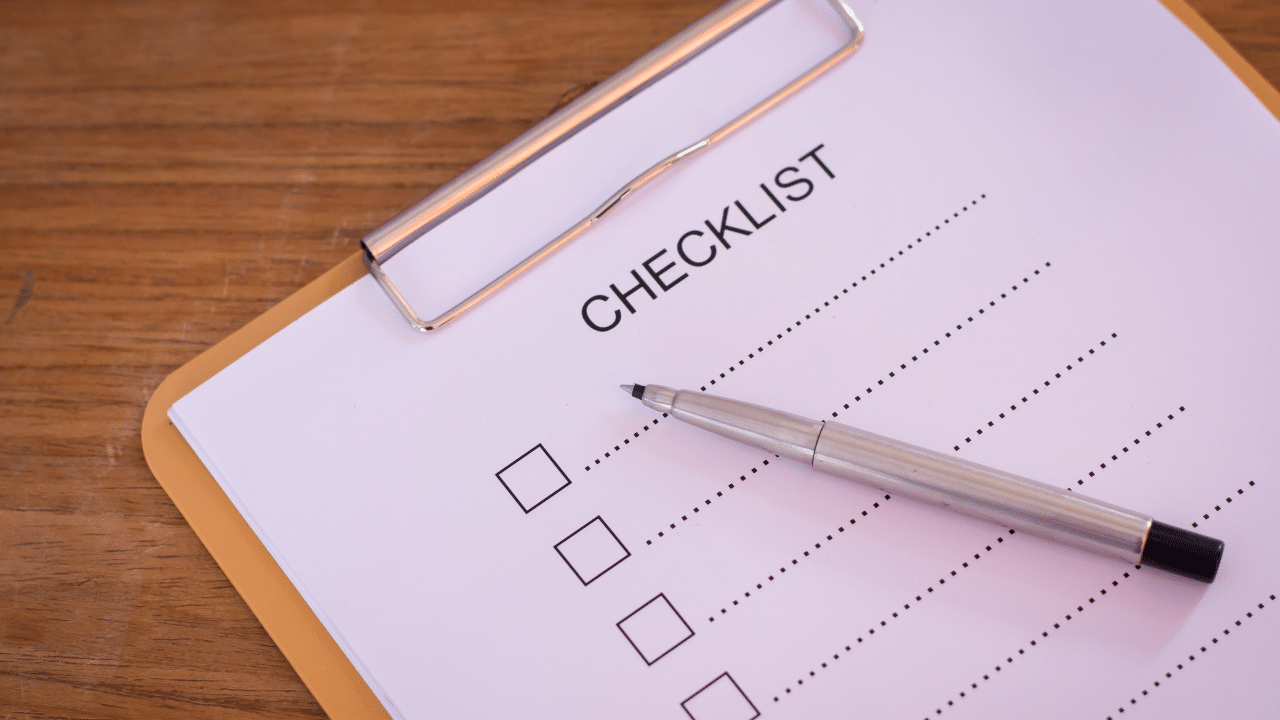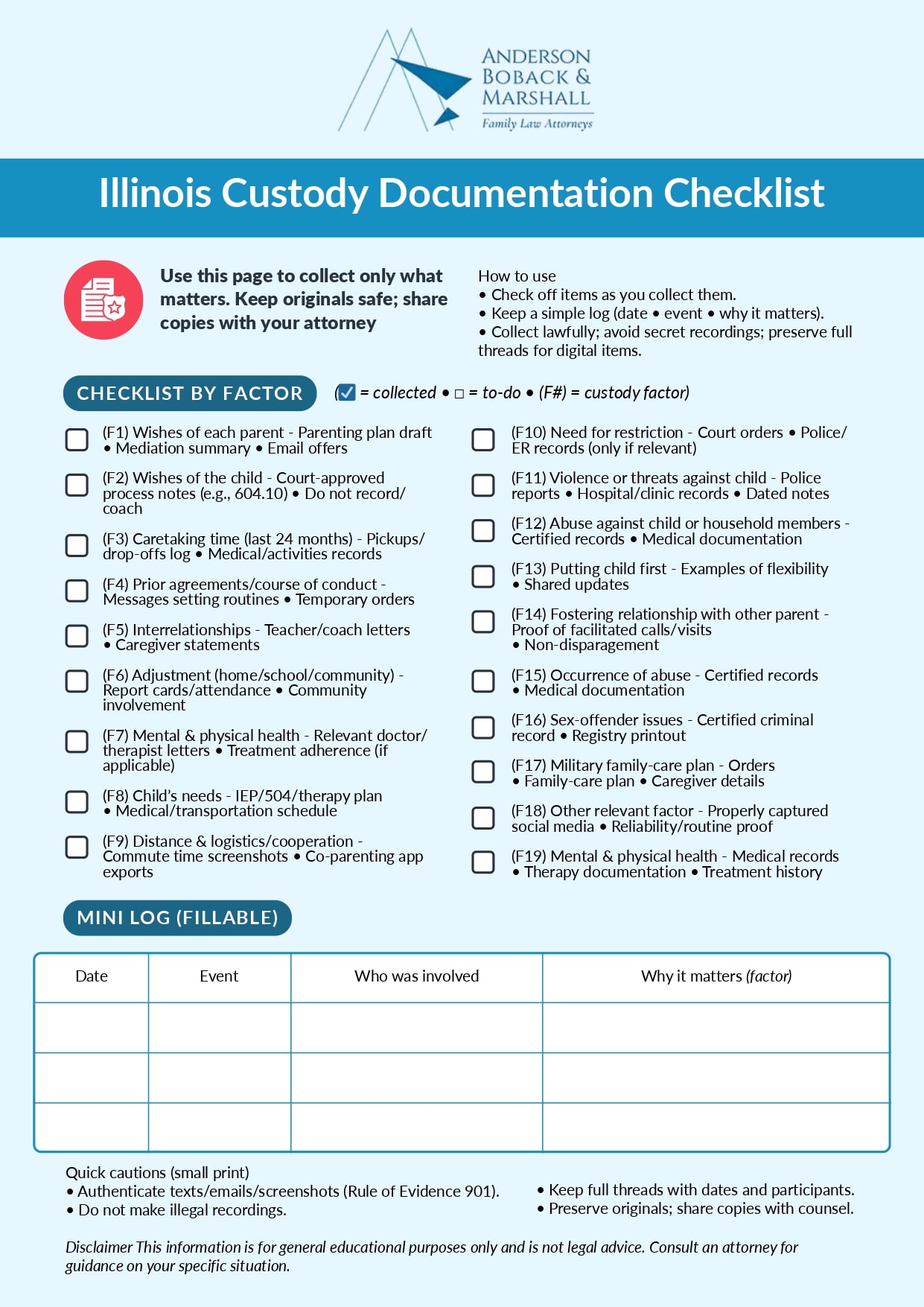If you’re preparing for an Illinois custody case (allocation of parental responsibilities and parenting time), your documents tell the court what day-to-day life looks like for your child. This Illinois custody documentation checklist maps directly to the “best interests” factors in 750 ILCS 5/602.7 so you gather what matters and gather it lawfully. Inside, you’ll find a factor-by-factor list of evidence to collect, simple ways to organize files the court can trust, and common mistakes to avoid.
Why documentation matters in Illinois custody cases
Illinois courts allocate parenting time according to the child’s best interests using specific, non-exclusive factors in 750 ILCS 5/602.7. Your goal is to show, with clear records, how your everyday parenting meets your child’s needs, not to “win” against your co-parent.
Legal note: keep it clean and admissible
- Authenticate digital items (texts, emails, screenshots) and keep originals. Illinois Rule of Evidence 901 requires proof that an item is what you claim it is.
- Do not secretly record private conversations. Illinois’s eavesdropping law generally requires consent for recording private communications; illegally obtained recordings can be excluded and can backfire.
Factor-by-factor custody documentation checklist (mapped to all 17 factors)
Use the “What to collect” prompts. Keep copies for your attorney and store originals safely.
Factor 1: Wishes of Each Parent (602.7(b)(1))
What to collect: Proposed parenting plans, calendars, parenting-time proposals, mediation summaries, and emails that show reasonable offers. Caution: Date-stamp drafts; avoid inflammatory language.
Factor 2: Wishes of the Child (602.7(b)(2))
What to collect: Notices of any court-approved process, such as an in-chambers interview or a professional evaluation ordered under 604.10. Copies of any reports from a Guardian ad Litem appointed by the Court. Caution: Do not interview, coach, or record your child; the court has formal channels for this.
Factor 3: Time Spent Performing Caretaking in the Last 24 Months (b)(3)
What to collect: Pickup/drop-off logs, medical/dental appointments, extracurricular sign-ins, childcare invoices, timestamped photos.
Factor 4: Prior Agreements or Course of Conduct (b)(4)
What to collect: Emails/texts setting routines (such as for parenting time, homework, bedtime, activities), temporary orders, written agreements.
Factor 5: Child’s Interactions and Interrelationships (b)(5)
What to collect: Teacher or coach letters (properly requested), caregiver statements, appropriate photos showing healthy relationships. Caution: Obtain records the right way; don’t access anyone else’s private accounts.
Factor 6: Adjustment to Home, School, and Community (b)(6)
What to collect: Report cards, attendance records, IEP/504 plans, progress notes, club or team rosters, proof of community involvement.
Factor 7: Mental and Physical Health of All Individuals (b)(7)
What to collect: Doctor/therapist letters focused on parenting capacity (when appropriate – talk to your attorney before seeking these letters), medication adherence summaries, treatment plans related to caregiving. Caution: Share only what’s relevant to parenting and protect private health data.
Factor 8: Child’s Needs (b)(8)
What to collect: IEPs, therapy recommendations, medical schedules, dietary/transportation needs, medicines, after-school supports.
Factor 9: Distance, Logistics, and Ability to Cooperate (b)(9)
What to collect: Commute-time screenshots, school start/end times, work schedules, and exports from a co-parenting app that show timely communication and flexibility. For help shaping a plan, you can review our guide on creating the right parenting time schedule in Illinois.
Factor 10: Whether a Restriction on Parenting Time Is Appropriate (b)(10)
What to collect: Court orders, police reports, ER/medical records, and safety plans only when relevant to serious endangerment.
Factor 11: Physical Violence or Threats (b)(11)
What to collect: Police reports, court filings, hospital/clinic records, text messages, social media posts, and dated notes with witnesses (if any).
Factor 12: Ability to Put the Child’s Needs First (b)(12)
What to collect: Proof of flexibility (e.g., swapping time for a doctor’s appointment, test, or game), prompt sharing of information, and honoring the child’s routine even when inconvenient.
Factor 13: Willingness to Foster a Close Relationship with the Other Parent (b)(13)
What to collect: Evidence that you facilitated calls/video chats, shared school/medical updates, and refrained from disparaging remarks in writing. Proof of flexibility with the other parent’s schedule (such as a family event or work conflict). For practical tips, our Parental Responsibilities Guide is a helpful companion.
Factor 14: Any Occurrence of Abuse (b)(14)
What to collect: Certified court records, medical documentation, and dated notes. Discuss safe handling with your attorney.
Factor 15: Sex-Offender Concerns (b)(15)
What to collect: Certified criminal records, registry printouts, and if relevant treatment completion records.
Factor 16: Military Family-Care Plan (b)(16)
What to collect: Deployment orders, the family-care plan, and communications about substitute caregivers and travel logistics.
Factor 17: Any Other Relevant Factor (b)(17)
What to collect: Social media posts (properly captured), messages showing reliability, and proof of a stable routine.
Caution: Capture full threads with dates and participants. Preserve originals to support authentication.
How to Organize and Store Your Custody Evidence
- Keep a chronological log (date, what happened, who was present, why it matters).
- Create folders by factor (F1–F17) with subfolders for school, health, and activities.
- Use file names like 2025-03-12_parent-teacher-conference_notes.pdf.
- Back up to secure cloud and a physical drive. Share copies with your lawyer; safeguard originals.
- Export full text/email threads. Record how you obtained each item so it can be authenticated later. For a smart head start, review how to prepare for your first meeting with a child custody attorney.
What’s inside the PDF:
- A concise, 17-factor checklist (with short prompts for what to collect)
- A mini logging template (date · event · why it matters)
- Quick admissibility cautions and organization tips
Mistakes to avoid when gathering custody evidence
- Over-collecting: A data dump buries your strongest points.
- Missing deadlines: Courts set firm dates for disclosures and exhibits calendar them.
- Altering files/metadata: Editing can damage credibility and lead to exclusion.
- Recording without consent: Don’t risk illegal recordings; ask your attorney about safe documentation options. For a deeper dive, read our tips to avoid mistakes in a custody battle.
When to share your documentation with an attorney
Early. A lawyer can spot gaps, prioritize the strongest exhibits, and plan how to present your story. If a child’s wishes must be considered, your attorney will discuss court-approved options like an in-chambers interview or a professional evaluation under 604.10, or an appointment of a Guardian ad Litem. If you’re considering a change after an order, learn about modifying parenting time in Illinois.
Conclusion: Preparation is your best custody strategy
Great documentation tells your child’s story clearly, factor by factor. Start now, keep it lawful and organized, and let your evidence show the court how you consistently meet your child’s needs. When you’re ready, talk with our Parenting Time & Visitation attorneys about strategy and next steps.
Illinois custody documentation FAQs
What documents should I gather first for an Illinois custody case?
Start with high-impact items: a proposed parenting plan, a 24-month caretaking log (pickups, appointments, overnights), recent school records (report cards/attendance), healthcare records tied to parenting, and a clean export from your co-parenting app or email showing cooperation.
How do I capture text messages and social posts so a court will consider them?
Export full threads (not single screenshots) with names or numbers and timestamps visible. Save originals, avoid edits/cropping, back up to cloud and a drive, and keep the device available if authentication becomes an issue.
Can teachers, coaches, or caregivers provide useful statements and how should I request them?
Yes. Ask for factual summaries on letterhead that include dates, observations related to the child, and contact info. Do not script or coach what to say; your attorney can advise whether to use a subpoena for formal records. Know that these people will likely have to testify in a court proceeding as to their statements.
When should I stop collecting and hand everything to my attorney?
Hand off early when you anticipate litigation, receive a scheduling order, or before mediation/discovery deadlines. Provide an index of files, keep originals safe, and send your attorney organized copies by factor.
Do I need every factor under 750 ILCS 5/602.7 to favor me?
No. Judges weigh the total picture. Quality and relevance beat volume; prioritize the factors that most affect your child’s day-to-day needs and your ability to meet them.
















